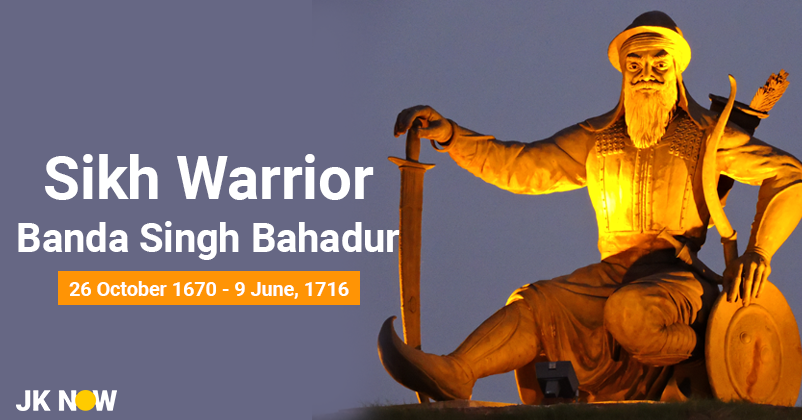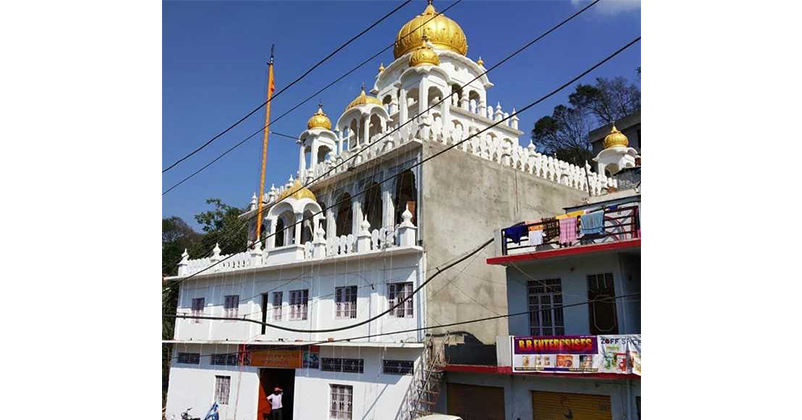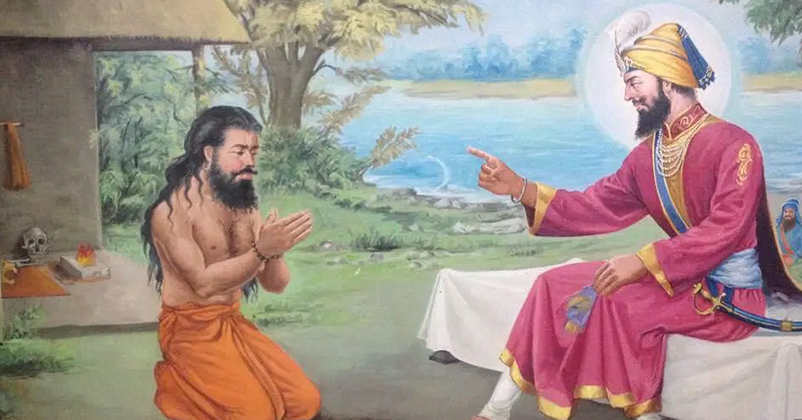Remembering the legendary Sikh Warrior, Banda Singh Bahadur
27 Oct 2023 13:59:27

Banda Singh Bahadur, also known as Banda Bahadur, was a Sikh military commander and leader who played a significant role in the early 18th century. He led the Sikh Khalsa army in a series of campaigns against the Mughal Empire in the Punjab region. Banda Singh Bahadur is remembered for his efforts to establish a Sikh state in the region and for his commitment to Sikh principles. His rule, however, was short-lived, and he was eventually captured and executed by the Mughals in 1716. He remains a revered figure in Sikh history for his bravery and devotion to Sikhism.
His early life
Banda Singh Bahadur was born in the Rajouri district of Jammu and Kashmir, India. At the time of his birth in 1670, this region was under the control of the Mughal Empire. Banda Singh Bahadur's birth name was Lachhman Dev, ( Hindu Rajput, adopted Sikhism later) and he adopted the name Banda Singh Bahadur after becoming a prominent figure in Sikh history. In his memory, a historical gurudwara has also been built at his birthplace in Rajouri.

Historical gurudwara in memory of warrior Banda Singh Bahadur in J&K’s Rajouri.
He left his house at the age of 15 and became a disciple of Bairagi Janki Parsad, who later took him to Punjab and renamed him as Madho Das Bairagi. He later shifted to Nasik (Maharashtra) and then Nanded where he erected a small cottage and took to a life of austerities. He also built a hut to meditate upon god. But his life took a dramatic turn when he became a follower of Guru Gobind Singh (the tenth Sikh Guru).
Inspired by the Guru's teachings and the persecution of Sikhs under Mughal rule, he took on the name Banda Singh Bahadur and became a prominent leader in the Sikh community.
In September 1708, Guru Gobind Singh conferred the title of Bahadur on Madho and made him his deputy with full political and military authorities and also provided the advisory council of five Khalsas and 25 soldiers as bodyguard.

Madho Das and Guru Gobind Singh Ji.
Defending Sikhs from Mughal persecution
In 1708, after the death of Guru Gobind Singh, Banda Singh Bahadur assumed the role of a military commander and continued the struggle for Sikh rights and religious freedom. He and his followers waged a series of successful campaigns against the Mughal authorities and local landlords, establishing a Sikh state in the Punjab region. Banda Singh Bahadur was known for his progressive policies, which included the abolition of the zamindari system and the introduction of land reforms to benefit the common people.
His Battles
Battle of Samana (1709): This early battle marked the beginning of Banda Singh Bahadur's military campaign against the Mughals. While it ended inconclusively, it was a precursor to the later victories.
Battle of Sirhind: The Battle of Sirhind was a significant battle led by Banda Singh Bahadur, in 1710. Banda Singh Bahadur and his Sikh forces besieged the city of Sirhind, which was under Mughal control. After a fierce battle and a prolonged siege, Banda Singh Bahadur emerged victorious, capturing the city of Sirhind. This victory was a turning point in the Sikh-Mughal conflict and marked a significant moment in Sikh history. Banda Singh Bahadur's rule in Sirhind was characterized by social and religious reforms, as he established a Sikh state in the region.
Battle of Chappar Chiri (1710): Banda Singh Bahadur won a decisive victory against the Mughals at Chappar Chiri, which is near present-day Mohali, Punjab. This battle played a crucial role in establishing Sikh authority in the region.
Battle of Sadhaura (1710): He defeated Mughal forces at Sadhaura, solidifying his control over parts of Punjab and Haryana.
Battle of Sonepat (1710): In this battle, Banda Singh Bahadur's forces were victorious against the Mughals, further expanding their territorial control.
However, his rule faced significant challenges, including the might of the Mughal Empire. In 1710, the Mughals launched a massive offensive against Banda Singh Bahadur's forces, leading to a brutal siege of his fort in Gurdas Nangal.
Religious Freedom and Popular Uprising
He upheld and protected Sikh principles and ensured religious freedom for Sikhs during his rule. His leadership promoted Sikh values and practices. Banda Singh Bahadur's efforts inspired and united the Sikh community in a broader struggle against oppression, encouraging them to stand up for their rights and religious beliefs.
Brutal execution
Banda Singh Bahadur's execution by the Mughals was a brutal and tragic event in Sikh history. After his capture in 1716, he and his companions were subjected to severe torture. The Mughal authorities sought to make an example of him to discourage further Sikh uprisings.
Banda Singh Bahadur and his followers endured unimaginable suffering. They were mutilated, and their limbs were severed. After enduring immense pain and cruelty, Banda Singh Bahadur was brought before the Mughal officials. In an attempt to break his spirit and make him renounce Sikhism, they forced him to watch the execution of his own son, Ajai Singh, who was bricked alive.
Despite the extreme torment, Banda Singh Bahadur remained steadfast in his faith and did not waver from his Sikh beliefs. Ultimately, he was executed by beheading, but his unwavering commitment to Sikhism and his courage in the face of immense adversity made him a revered figure in Sikh history. His sacrifice and determination continue to inspire Sikhs and others who appreciate his legacy of resilience and devotion.